Overview
- The U.S. will impose a 25% tariff on all imported cars and auto parts starting April 3, marking a significant escalation in trade tensions with key allies.
- German automakers, heavily reliant on U.S. exports, are exploring costly and time-consuming shifts in production to the U.S. to mitigate the impact.
- The EU has expressed regret over the tariffs and is considering retaliatory measures, including potential digital taxes targeting U.S. tech companies, with decisions expected by mid-April.
- Economic analysts warn the tariffs could drive up car prices in the U.S., exacerbate inflation, and potentially trigger a recession, straining both consumers and manufacturers.
- Trump's protectionist trade policy aims to boost domestic production and reduce trade deficits but risks deepening global trade conflicts and disrupting supply chains.



